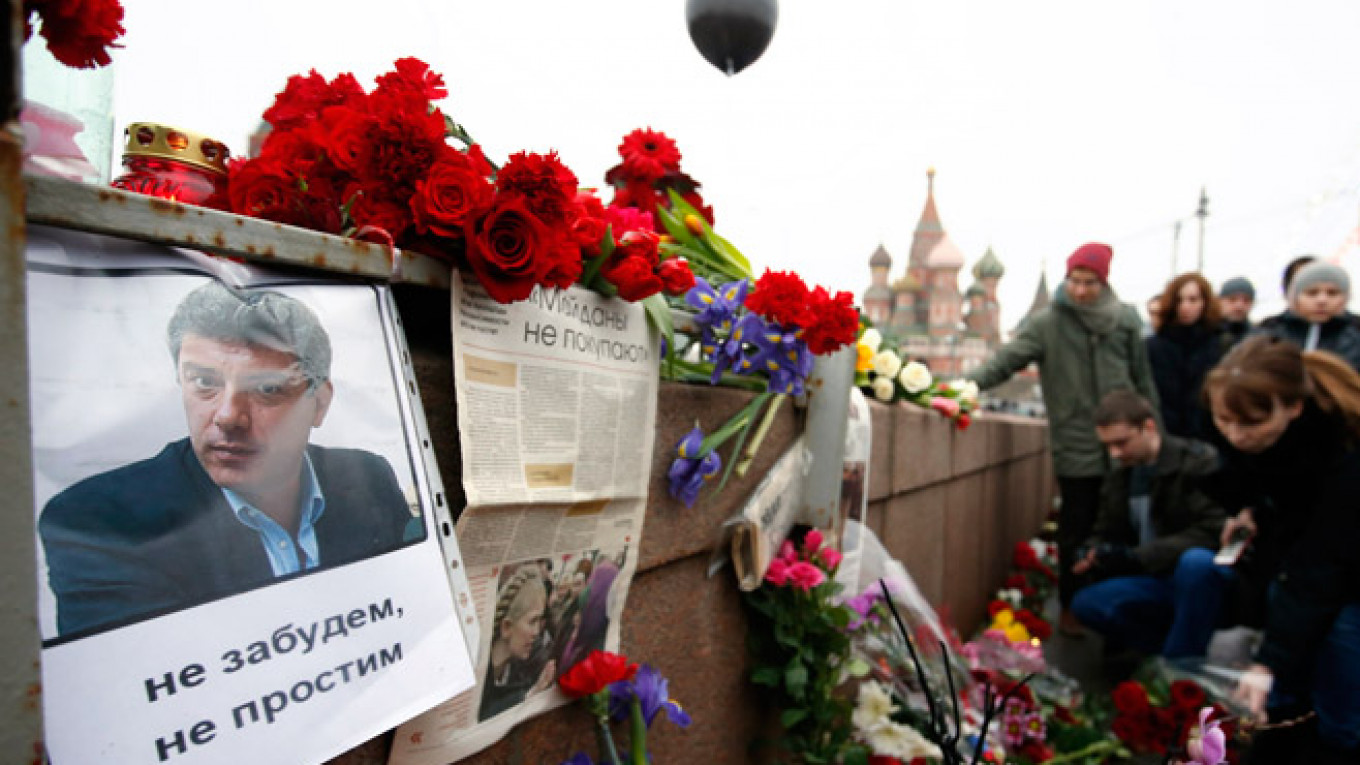As tragic and horrifying as the murder of opposition politician Boris Nemtsov is, it will not be a game changer — not in the short term, anyway. It is not going to stop witch hunts on Russian television. It will not lead to a rethink of Russian objectives in eastern Ukraine.
This violent act will, of course, galvanize the Russian opposition — but it may also introduce a measure of doubt, and even distrust, into their ranks. The police, after all, is likely to make a big show of investigating (or, for that matter, "investigating") the murder, and it remains to be seen just who may potentially end up with the blame.
When Malaysia Airlines Flight MH17 was tragically shot down over eastern Ukraine last summer, there was an immediate sense that something would have to change. Surely the conflict had gone too far. Two hundred and ninety-eight innocent people were on board, 80 children among them.
MH17 changed nothing, of course. For one thing, plenty of other people were dead by that time already. Both sides had suffered losses and were eager to avenge them.
Second, the great geopolitical game over Ukraine was never going to be over just like that.
Pictures of dead children, their bodies left to rot in the unforgiving summer heat, were soon replaced by other grisly pictures. The terrible reaping continued. More died, more suffered horrible wounds, and more were forced to flee their homes.
Now a dramatic act of violence has taken place in the very heart of Moscow, outside the Kremlin's walls. The victim is a former establishment figure turned anti-government crusader — which ought to make everyone's skin crawl.
Russia is a country where most political careers are marked by upheavals. Smart government insiders know that tomorrow they may end up on the outside, looking in. They know that if such a thing could be done to Nemtsov today, it means that anyone else could be fair game tomorrow.
Intentionally or not, Nemtsov's murder, as well as the location of the crime scene, which powerfully suggests that nowhere in Moscow is truly safe, does hint at destabilization.
As television personality Ksenia Sobchak put it, it would be oddly reassuring if we knew that the Kremlin ordered the hit. At least that would introduce a measure of clarity.
Instead what we seem to have is a shadowy force willing to commit grotesque violence in a heavily policed area, as if taunting everyone, including the Kremlin itself.
The truth is, the genie may well be out of the bottle. Constant hatemongering — on television, online, in the streets — does create an atmosphere conducive to atrocity.
Putin's high approval rating, a State Duma that does what it's told, and lack of any systemic opposition probably makes officials believe that they can control hatred and direct it as needed. It is easy for them to make a public enemy out of any individual or group, be it LGBT people, Ukrainians, the liberal opposition — which included Nemtsov — Americans, etc.
If today it were decided that it would be politically expedient to target red-haired people, tomorrow's television programs would be full of specials such as "Jessica Rabbit was a brainwashing tool of the Illuminati."
But hatemongering is a bit like lighting a fire. Striking a match is effortless, but then it all depends on where the match falls. And where the wind is blowing.
There are certain forces that can never be fully brought to heel — especially in a country like Russia, a huge territory governed by complicated alliances, where control is often illusory to begin with.
Will Nemtsov's death put the brakes on anti-liberal propaganda? Not likely. Much like with MH17, conspiracy theories are already being disseminated. The victim will be cast as someone who "brought it on himself" — with his lifestyle, perhaps, or due to his business interests, or false friends from within the opposition, eager to frame the government.
In time, Nemtsov's death may be looked upon as the first clear sign that destabilization next door in Ukraine can violently affect people on Russian soil as well.
For now, though, don't expect it to change anything.
Natalia Antonova is an American playwright and journalist.
A Message from The Moscow Times:
Dear readers,
We are facing unprecedented challenges. Russia's Prosecutor General's Office has designated The Moscow Times as an "undesirable" organization, criminalizing our work and putting our staff at risk of prosecution. This follows our earlier unjust labeling as a "foreign agent."
These actions are direct attempts to silence independent journalism in Russia. The authorities claim our work "discredits the decisions of the Russian leadership." We see things differently: we strive to provide accurate, unbiased reporting on Russia.
We, the journalists of The Moscow Times, refuse to be silenced. But to continue our work, we need your help.
Your support, no matter how small, makes a world of difference. If you can, please support us monthly starting from just $2. It's quick to set up, and every contribution makes a significant impact.
By supporting The Moscow Times, you're defending open, independent journalism in the face of repression. Thank you for standing with us.
Remind me later.








